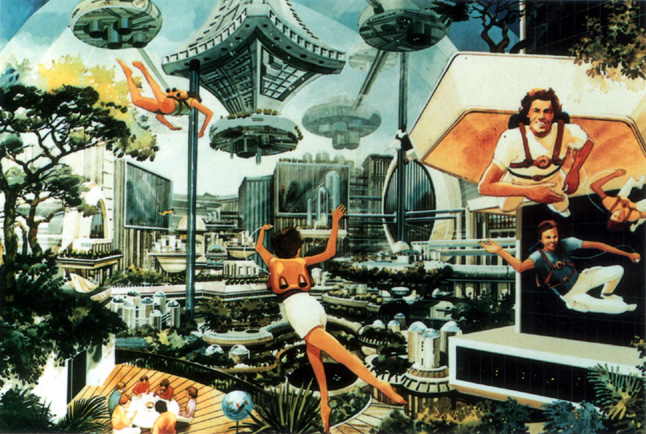The moon landing was supposed to be the beginning of the Space Age, but the giant leap turned out to be a small step. A mission to Mars, let alone a full-fledged settlement in space, was shelved. But billionaire entrepreneurs weaned on sci-fi are taking aim again at the stratosphere. The opening of Jessa Gamble’s Guardian article “How Do You Build a City in Space?“:
“Science fiction has delivered on many of its promises. Star Trek videophones have become Skype, the Jetsons’ food-on-demand is materialising through 3-D printing, and we have done Jules Verne one better and explored mid-ocean trenches at crushing depths. But the central promise of golden age sci-fi has not yet been kept. Humans have not colonised space.
For a brief moment in the 1970s, the grandeur of the night sky felt interactive. It seemed only decades away that more humans would live off the Earth than on it; in fact, the Space Shuttle was so named because it was intended to make 50 round trips per year. There were active plans for expanding civilisation into space, and any number of serious designs for building entire cities on the moon, Mars and beyond.
The space age proved to be a false dawn, of course. After a sobering interlude, children who had sat rapt at the sight of the moon landings grew up, and accepted that terraforming space – once briefly assumed to be easy – was actually really, really hard. Intense cold war motivation flagged, and the Challenger and Columbia disasters taught us humility. Nasa budgets sagged from 5% of the US federal budget to less than 0.5%. People even began to doubt that we’d ever set foot on the moon: in a 2006 poll, more than one in four Americans between 18 and 25 said they suspected the moon landing was a hoax.
But now a countercurrent has surfaced. The children of Apollo, educated and entrepreneurial, are making real headway on some of the biggest difficulties. Large-scale settlement, as opposed to drab old scientific exploration, is back on the menu.”
Tags: Jessa Gamble

